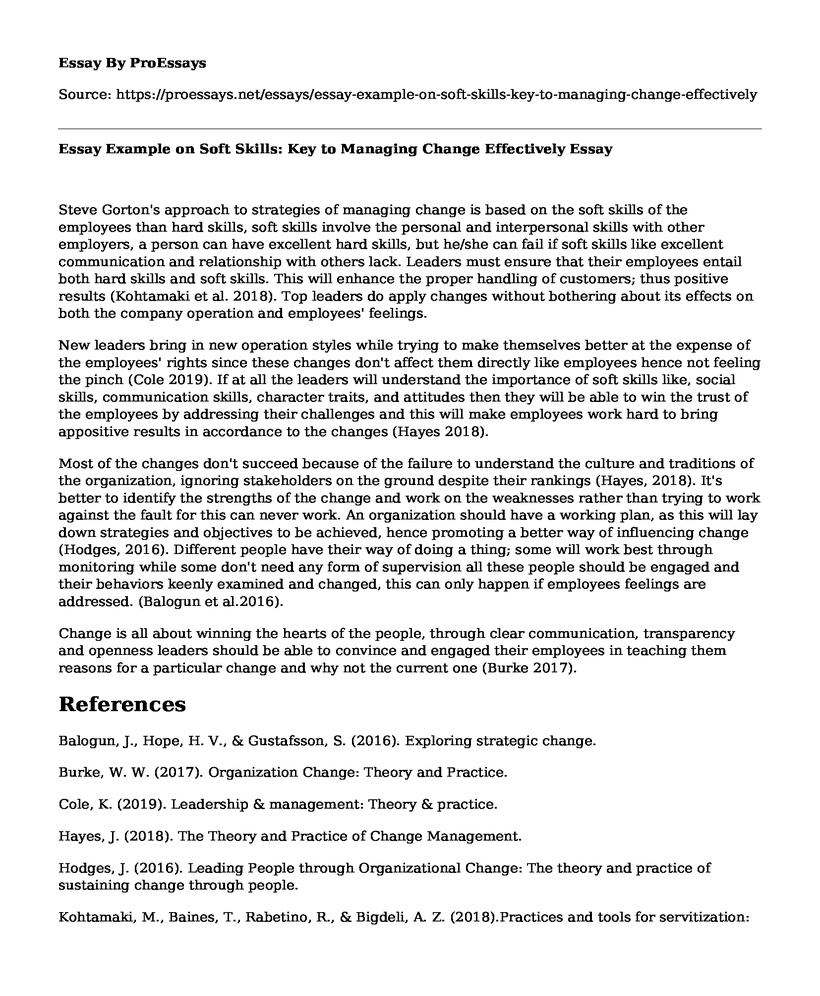Steve Gorton's approach to strategies of managing change is based on the soft skills of the employees than hard skills, soft skills involve the personal and interpersonal skills with other employers, a person can have excellent hard skills, but he/she can fail if soft skills like excellent communication and relationship with others lack. Leaders must ensure that their employees entail both hard skills and soft skills. This will enhance the proper handling of customers; thus positive results (Kohtamaki et al. 2018). Top leaders do apply changes without bothering about its effects on both the company operation and employees' feelings.
New leaders bring in new operation styles while trying to make themselves better at the expense of the employees' rights since these changes don't affect them directly like employees hence not feeling the pinch (Cole 2019). If at all the leaders will understand the importance of soft skills like, social skills, communication skills, character traits, and attitudes then they will be able to win the trust of the employees by addressing their challenges and this will make employees work hard to bring appositive results in accordance to the changes (Hayes 2018).
Most of the changes don't succeed because of the failure to understand the culture and traditions of the organization, ignoring stakeholders on the ground despite their rankings (Hayes, 2018). It's better to identify the strengths of the change and work on the weaknesses rather than trying to work against the fault for this can never work. An organization should have a working plan, as this will lay down strategies and objectives to be achieved, hence promoting a better way of influencing change (Hodges, 2016). Different people have their way of doing a thing; some will work best through monitoring while some don't need any form of supervision all these people should be engaged and their behaviors keenly examined and changed, this can only happen if employees feelings are addressed. (Balogun et al.2016).
Change is all about winning the hearts of the people, through clear communication, transparency and openness leaders should be able to convince and engaged their employees in teaching them reasons for a particular change and why not the current one (Burke 2017).
References
Balogun, J., Hope, H. V., & Gustafsson, S. (2016). Exploring strategic change.
Burke, W. W. (2017). Organization Change: Theory and Practice.
Cole, K. (2019). Leadership & management: Theory & practice.
Hayes, J. (2018). The Theory and Practice of Change Management.
Hodges, J. (2016). Leading People through Organizational Change: The theory and practice of sustaining change through people.
Kohtamaki, M., Baines, T., Rabetino, R., & Bigdeli, A. Z. (2018).Practices and tools for servitization: Managing service transition.
Cite this page
Essay Example on Soft Skills: Key to Managing Change Effectively. (2022, Dec 27). Retrieved from https://proessays.net/essays/essay-example-on-soft-skills-key-to-managing-change-effectively
If you are the original author of this essay and no longer wish to have it published on the ProEssays website, please click below to request its removal:
- The Fair Labor Standards Act Essay Example
- Public Accountant Personal Statement Paper Example
- The Key to Success: Essay Sample on Self-Belief and Courage
- Research Paper on Deviance: Excessive Gambling, Alcoholism & More
- Sleep: A 4-Week Project to Improve Wellness - Essay Sample
- Essay Example on Performance-Based Pay: Merit, Recognition, Incentives & Earnings
- Overcome Fear of Flying - One in Three Americans Affected - Essay Sample







